Ecwid is short for “ecommerce widgets.” This sort of describes what Ecwid does. Ecwid (pronounced “ehk-wid”) is basically a shopping cart widget that incorporates into any website with just a few lines of code. Using Ecwid, you can sell across multiple websites, social networks, and marketplaces, all while managing your expanding ecommerce empire from one easy-to-use admin.
Ecwid’s beginnings reach back to 2000 when CEO Ruslan Fazlyev developed the very first PHP ecommerce platform, X-Cart. But when Fazlyev realized that many merchants already had websites they wanted to monetize, he took a new approach and created the Ecwid plugin.
Over the past decade, Ecwid has grown to serve over 1.5 million merchants across 175 countries. With new features released every month, it’s clear Ecwid is still growing. If you’re considering adding a store to your thriving website, or even starting up an online presence for the first time, Ecwid may be the “eh-commerce” solution that fits your needs.
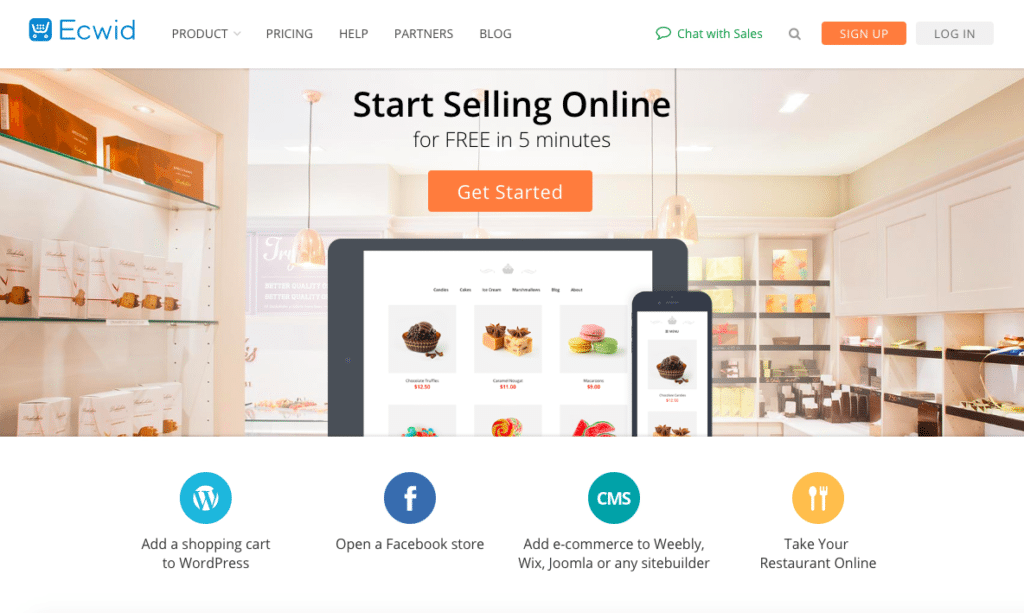
Ecwid is a web-based online store builder that is designed for businesses and individuals who have existing websites. Unlike other similar solutions, Ecwid doesn’t require users to create a new e-commerce website, but rather build an online store they can add to their website. With Ecwid, users can create online catalogs using an intuitive builder functionality. The tool also comes with a rich set of features such as photos, accept payment via credit cards, shipping rates, etc. The main difference with other e-commerce platforms is that Ecwid is basically a widget and a not a standalone online store. Ecwid can be embedded not only on your website, but also on your business page on Facebook or Twitter, mobile apps, blogs, and marketplaces. With a unified control panel, all your Ecwid storefronts are synchronized and easy to manage.
Ease of Use
Going by the recent control panel redesign, it goes without saying that Ecwid is pleasantly simple and straightforward. Even a beginner should, admittedly, have an easy time navigating the backend end functions. All the principal functions are laid out systematically on the left panel of the Ecwid dashboard, while the right side is reserved for their corresponding options.
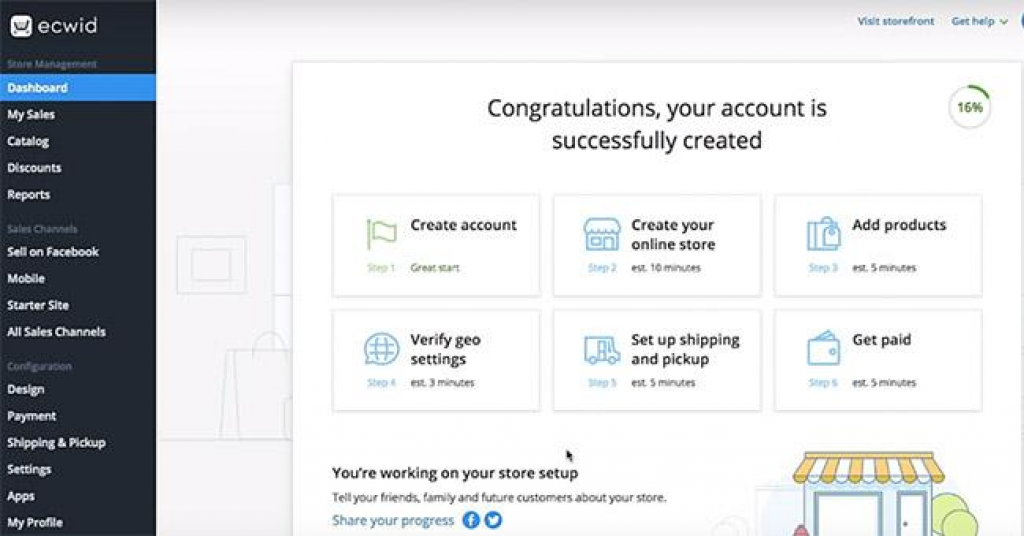
One can get started on Ecwid without paying for anything. This makes the setup process much easier because you just need to punch in your email and create a password to go straight to the backend interface.
Now, to get your store up and running, Ecwid provides wizards for every platform you might want to place your ecommerce site on. If you have a WordPress site, for example, it only takes about three steps to fully integrate Ecwid. You can alternatively click on options like Facebook and Joomla, depending on where you want to sell.
That said, the backend on-boarding process is flawless, since Ecwid walks you through every site creation and integration step with some nice photos and text. You can start working on your storefront in no time by adding products along with their attributes.
In the end, your Ecwid storefront design depends somewhat on the theme you have on your website. You don’t get any default templates for customizing your online store. But then again, that might not be necessary since Ecwid is capable of adapting to your site’s current theme. It automatically scans, detects, and analyses your original fonts plus colors, before applying them to your product display.

Moving on, the web backend is only one part of the holistic Ecwid platform. It’s nice knowing that Ecwid includes a native shopping application for both iOS and Android. As a result, merchants can download a native management application for iOS and Android at no extra cost. That alone means you can manage your Ecwid store and sell on-the-go, while also giving your customers a chance to buy products from the mobile interface.
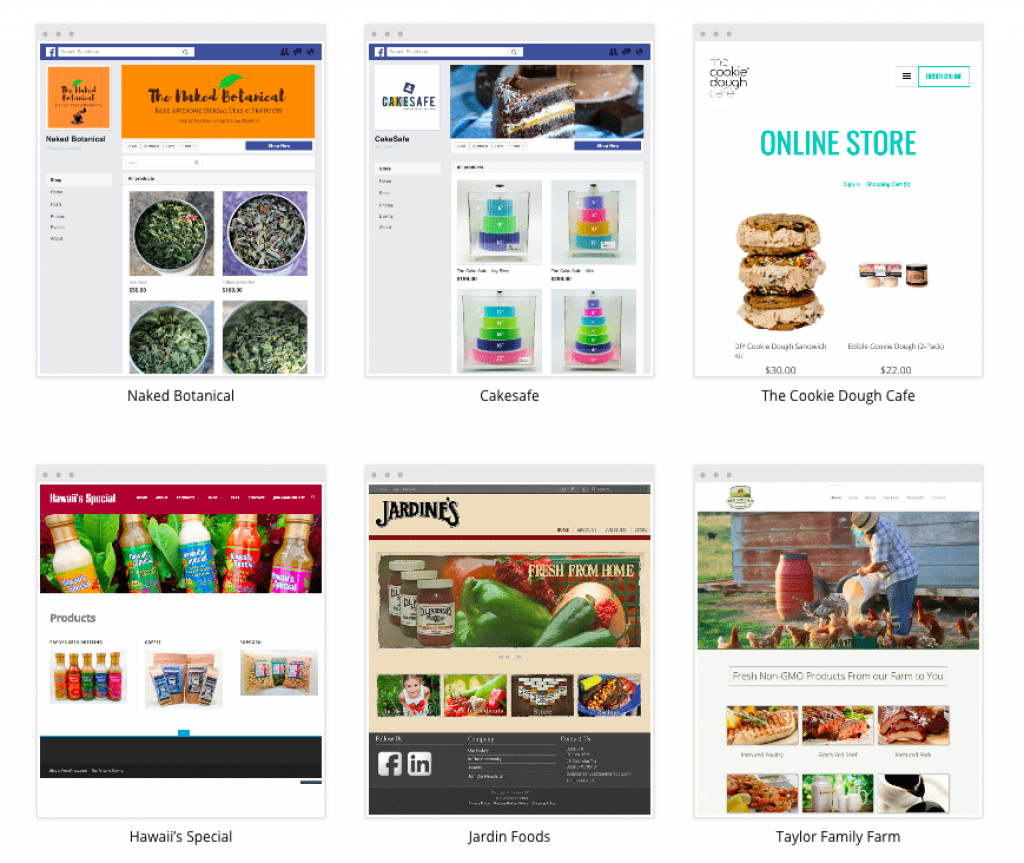
For customers who buy directly from the storefront, one exceptionally handy feature is the language tool. And the reason is simple – since running an online store generally requires you to reach out to people from all over the world, you’re bound to stumble upon customers who would like to read product pages and other content in their native tongue.
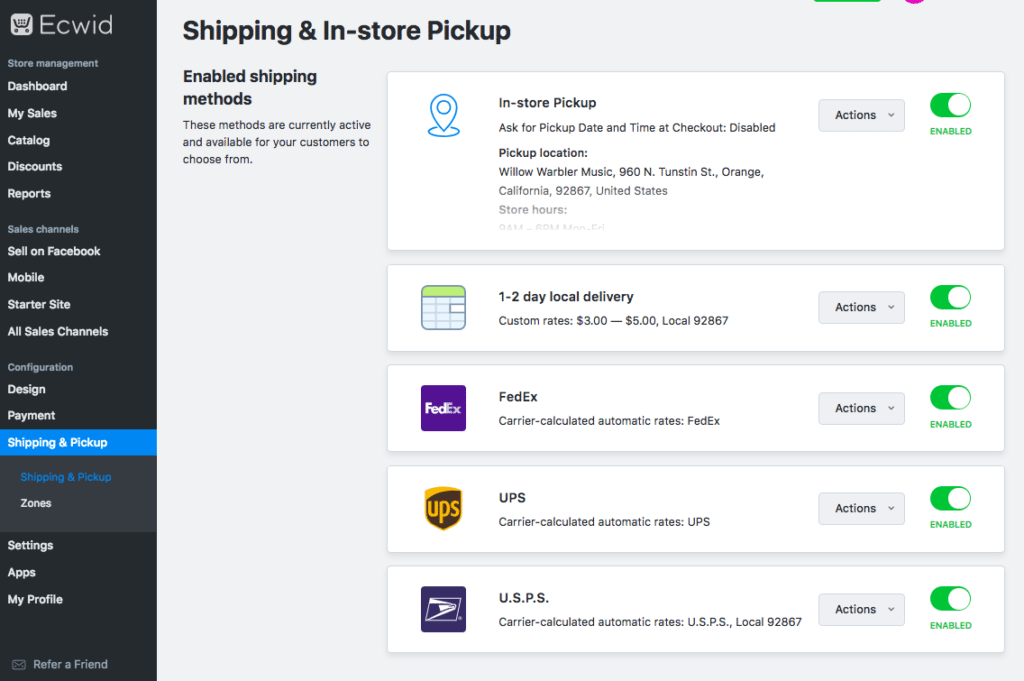
Ecwid can automatically detect and translate more than 51 languages. Therefore, you can bet you’ll be able to sell comfortably to Non-English speaking buyers from all over the world.
Ecwid Inventory Management
The Ecwid inventory system is as simple as they come, so you can simply go to Ecwid’s Catalog menu option, and edit your products’ categories, description, name, price, attributes, and image. It’s also possible to set SEO settings as well as tax and shipping options of each product in your Ecwid inventory.
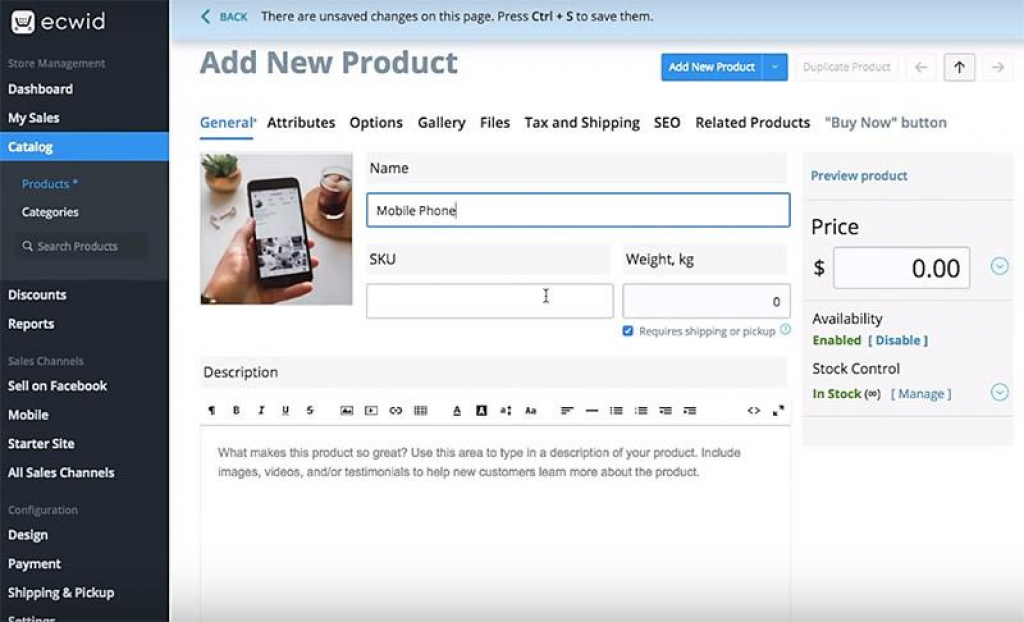
Other inventory management features offered by Ecwid include out of stock product tracking, mobile device inventory management, barcode scanning, stock control management, product duplication, and more.
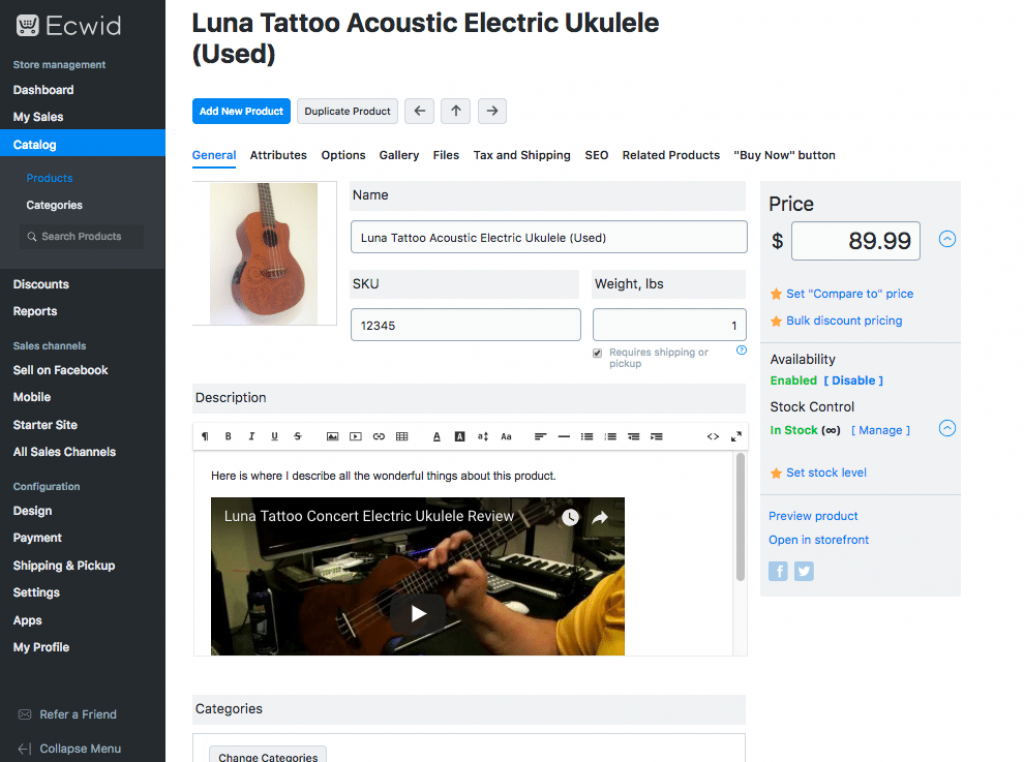
Features
Ecwid comes with a surprisingly expansive feature set straight out of the box, especially considering a lot of folks simply add Ecwid to a site that already exists. More features are always in development, and all are added to your admin automatically.
Below are some of the key features Ecwid currently offers. As always with this type of software platform, check your plan level to verify which features are included, and don’t forget that you can’t add integrations without a paid subscription to Ecwid.
Sales Channels
- Sell Across Multiple Websites: Manage everything from one admin.
- Social Media Integrations: Sell on your Facebook page, Instagram, and more. Note that a Facebook shop is no longer included as part of the free Ecwid subscription for new users.
- Marketplace Integrations: Current options include Amazon, eBay, Google Shopping, Yahoo! Shopping, PriceGrabber, Nextag, Shopzilla, and Yandex.Market.
- In-Person Selling: Pair Ecwid with NCR Silver, Square, Clover, Vend, or PayPal Here to accept payments in person.
- ShopApp: Create a self-branded app for your store for both iOS and Android shoppers.
Store Management
- Sell Digital Goods: Make sure to specify that your digital products don’t require shipping.
- Product Options & Attributes: Create variants for your products such as sizes and colors.
- Inventory Management: Track stock levels in your admin.
- Order Management: Create, edit, and track orders.
- Promotions & Discounts: Set up promotional pricing, discount codes, and volume discounts. Some discounts (e.g., Buy X, Get Y) require extensions.
- Abandoned Cart Recovery: Contact customers after they leave products in their cart to boost sales. This feature comes at a higher subscription level on some competing carts, so Ecwid scores points here.
- Mobile Store Management App: Manage your admin anywhere from your mobile device.
- Analytics & Reporting: A simple reporting tool comes in your dashboard, but it upgrades with a paid Ecwid subscription.
- SEO Tools: Customize meta data for your products and pages.
Customer Experience
- Language Capabilities: Your store automatically translates to 50+ different languages based on your customers’ browser settings, and your control panel is available in 20+ languages. Ecwid outshines most of its competitors on the translation front.
- Real-Time Shipping Rates: Ecwid uses your customers’ IP addresses to calculate shipping expenses with major mail carriers, including UPS, USPS, FedEx, Australia Post, and Canada Post. Additionally, create personalized shipping tables, flat-rate shipping, and local pickup options.
- Automatic Tax Calculations: Charge the correct rate based on where both you and your customer are located.
- Checkout Options: Let your customers check out as guests or create an account.
- “Favorite” Button: Give customers the option to “Favorite” items to keep track of them later.
- Product Reviews: Customers can leave reviews and comments with the addition of a review app, such as Disqus.
Security
It seems that Ecwid takes security seriously, since the company is a PCI DSS Level 1 certified service provider. In addition to that, the company states that every transaction that includes sensitive information is transferred through a secure HTTPS channel.
That means you can rely on Ecwid to protect your customers’ confidential information. And just for clarity’s sake, Ecwid doesn’t handle, collect, or store your customers’ payment data. All the transactions processed directly by your payment processor.
The rest of the site data, on the other hand, is stored safely on Amazon Web Services secure servers. Then to reduce the chances of a disastrous breach, the entire Ecwid network is scanned and backed up on a regular basis.
Customer Support
Ecwid offers a “Chat With Sales” feature which is always one of my favourite ways to talk with companies. Simply send them a query and you can work on something else until they respond. The company also provides a powerful support section with FAQs, a knowledge base, email capabilities, and a forum. Overall, the support outlets include phone support, online chat support and email support, keeping the response time short and support quality high.
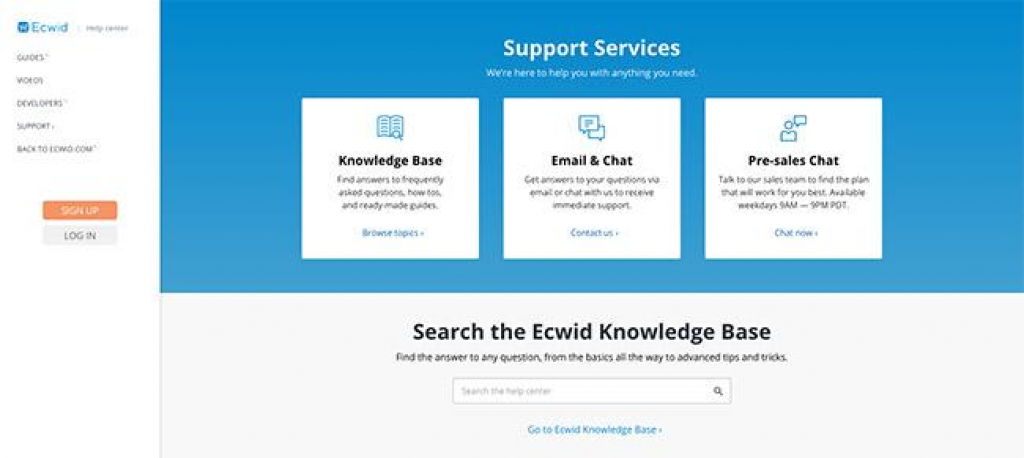
Payment Gateways and Fees
Ecwid never charge any sort of transaction fees on any of the plans they offer, making Ecwid a desirable ecommerce solution for any store trying to keep costs down or improve margins. But Ecwid is not a payment processor. That means you have to set up something like PayPal or Stripe to process all the transactions that come through your site. Speaking of which, it’s pretty easy to implement any of these systems, since Ecwid integrates with over 40 international payment options.
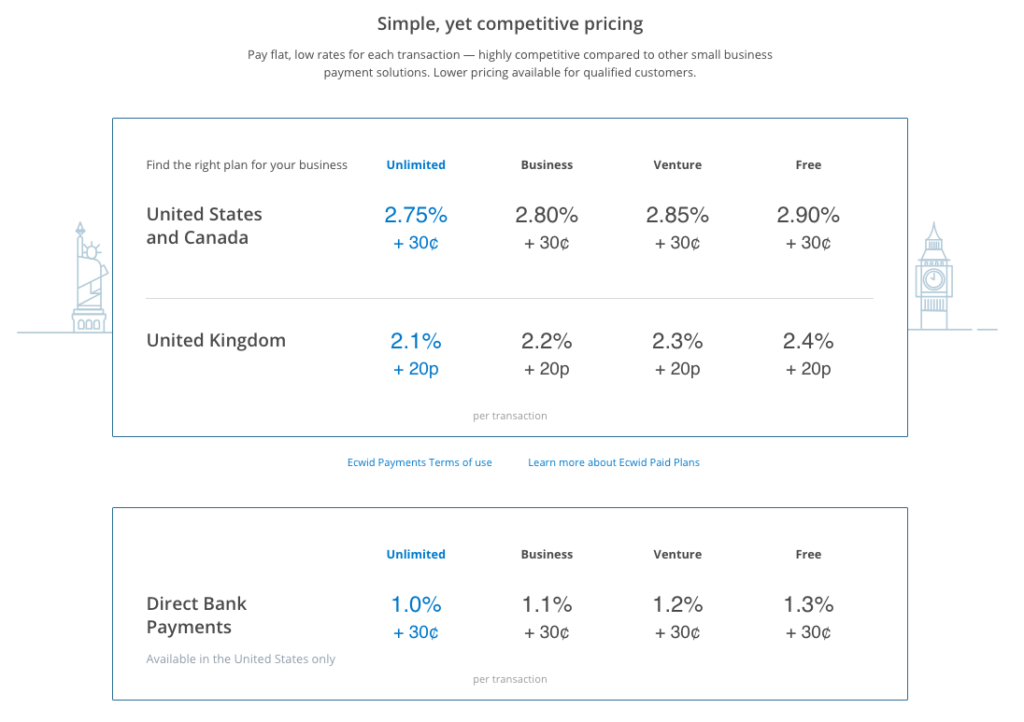
To collect both online and offline payments, Ecwid integrates with Square POS, Clover, Vend POS, iZettle and PayPal card readers, allowing Ecwid to turn your store setup into both an online and offline system.
Integrations & Add-Ons
Ecwid features a growing app marketplace. You’ll find several recognizable third-party integrations, as well as a plethora of smaller extensions that add minor features or tweak small aspects of your shop. Unfortunately, you’ll have to search Ecwid’s community forums to find out how users get on with these extensions, since there are no customer reviews within the Ecwid marketplace.
Adding any integration to your Ecwid shop–including free apps–requires a paid Ecwid subscription. Also, access to specific apps may be tied to higher subscription levels.
Some Ecwid add-ons you may recognize are:
- Zapier: Web apps connector to expand your add-on options.
- 71lbs: Automated shipping refunds.
- Printful: Custom printing and warehousing.
- AfterShip: Tracking and delivery updates.
- Lucky Orange: Discover how customers interact with your site.
- LiveChat: Customer chat and support tickets.
- McAfee SECURE Trustmark: Add both real and perceived safety to your store.
- ShippingEasy: One of our favourite shipping apps.
- ShipStation: Another popular app to process, fulfils, and ship orders.
- Xero: Popular accounting software.
- Freshbooks: Another well-known accounting option (Quickbooks is “coming soon”).
- TaxJar: Automated sales tax reporting and filing.
- Wholesale2b: Import products for dropshipping.
- All-In-One Dashboard (MonkeyData): eCommerce analytics.
Some ubiquitous apps are missing from Ecwid’s list, but Ecwid partly relies on the external site builders its clients use to help fill in gaps. Regardless, definitely investigate the full marketplace at Ecwid’s site, double-checking which subscription level is required for each app.
If you still don’t see what you need, there’s API documentation available so developers can build a custom connection for you.
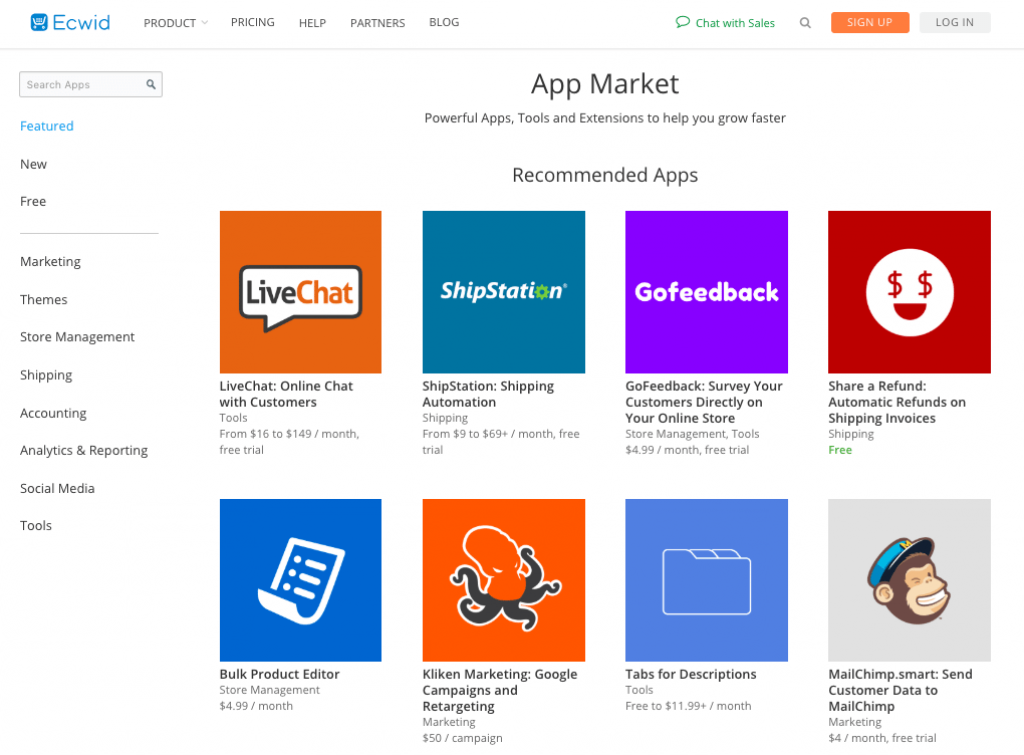
Pricing
Ecwid offers four SMB and enterprise pricing plans, including a free one for a single online store with unlimited bandwidth. Give the details a look, and select your plan:
Free
- Online store
- Facebook store
- Mobile responsive shopping cart
- Unlimited bandwidth
- Free starter site
- Add store to any website
- Sell simultaneously on multiple sites
- Personalized on-boarding
Venture – $15/month or $12.50/month (annual billing)
- All Free features
- Android and iOS store management app
- Abandoned cart saver
- Discount coupons
- Automated tax calculations
- Android and iOS store management app
- Access to App Market with extensions
- Inventory management
- Advanced SEO tools
- Social media tools
- Chat Support
Business – $35/month or $29.17/month (annual billing)
- All Venture Features
- Marketplaces
- Wholesale pricing groups
- Google Shopping
- eBay integration
- Create orders
- Chat and Phone Support
Unlimited – $99/month or $82.50/month (annual billing)
- All Business features
- Point of sale
- Customized mobile store app
- Square POS integration
- Priority support
- 12 hours of custom development
Competitors
Ecwid vs Shopify
Ecwid, for starters, is essentially an ecommerce extension that allows you to transform a regular site into an online storefront. Shopify, on the other hand, is basically a complete closed-source ecommerce platform that allows you to create an online store from scratch, and before hosting it on the platform. In a nutshell, therefore, Shopify is considered a powerful all-round ecommerce website builder (which includes an ecommerce hosting solution), while Ecwid targets website owners who simply want supplementary online selling features on their sites.
Ecwid vs Wix
Wix is one of the most dominant website builders on the market today. You can use it to create your own website, and then proceed to host it on the platform as you possibly embed online selling extensions. In contrast, Ecwid users have their own websites before they even consider leveraging Ecwid. And while Ecwid is a bonafide ecommerce solution, Wix is just a website builder that happens to support a wide range of ecommerce integrations.
Ecwid vs BigCommerce
BigCommerce is a lot like Shopify. It’s a fully-fledged ecommerce platform with website building and hosting features. However, it locks your website in the platform as soon as you get it up and running. Well, Ecwid cannot match up to BigCommerce when it comes to ecommerce functionalities. And that, when you come to think of it, makes Ecwid less complicated. All in all, Ecwid is suitable for start-ups and small business merchants who already own websites, while BigCommerce is built for growing businesses that are setting up online stores from scratch.
Summing Up
Although Ecwid is perhaps not ideal for very large companies, it’s just right for smaller e-commerce businesses. Subscriptions are quite affordable and the overall the learning curve is small. You can start with the aptly-named “Starter Site” for free if you have 10 or fewer products to sell. Then, if you’re digging it, you always have the option to keep the Starter Site setup forever and simply upgrade Ecwid plans as you require more features and apps.

But, Ecwid is extremely reliable if you already have a website. And it’s pretty straightforward. Simply integrate it as a plugin, and you’ll end up with a pretty sleek storefront at a very reasonable price.
In a nutshell, Ecwid is ecommerce made easy for small dynamic merchants who need flexible omnichannel commerce capabilities.